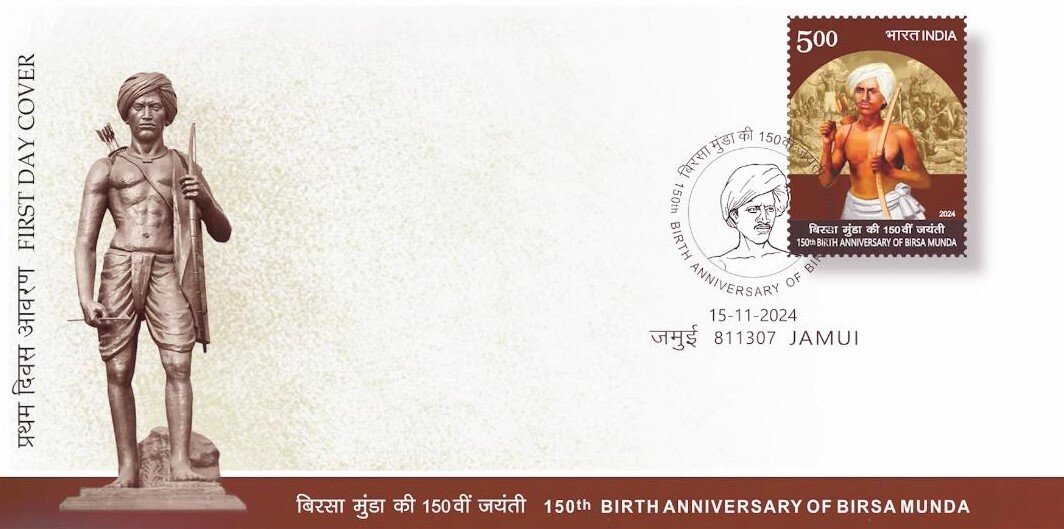150th Birth Anniversary of Birsa Munda

Technical Data
| Stamp Set | 150th Birth Anniversary of Birsa Munda |
|---|---|
| Date of Issue | November 15, 2024 |
| Denomination | Rs. 5 |
| Quantity | 202,800 |
| Perforation | 13½ |
| Printer | Security Printing Press, Hyderabad |
| Printing Process | Wet Offset |
| Watermark | No Watermark |
| Colors | Multicolor |
| Credit (Designed By) | Sh. Sankha Samanta |
| Catalog Codes |
Stanley Gibbons IN 3921 Colnect codes IN 2024.11.15-01 |
| Themes | Anniversaries and Jubilees | Famous people | Independency Activists | Men |
Birsa Munda, born on November 15, 1875, in Ulihatu, Bihar (now in Jharkhand), was a prominent tribal leader and a key figure in India’s struggle against British colonial rule. Revered as a folk hero, Birsa Munda’s life and legacy represent the fight for the rights of indigenous people, and his contributions have made him an iconic figure in Indian history. Birsa Munda belonged to the Munda tribe, one of the indigenous communities in the Chotanagpur Plateau region. Growing up in a family of traditional agriculturalists, he was steeped in the customs and traditions of his tribe, which instilled in him a deep sense of identity and belonging.
In his formative years, Birsa experienced the oppressive policies of British colonialism and the exploitation of tribal lands by moneylenders and landlords. The loss of tribal rights and land, along with the forced conversion of tribal people to Christianity by missionaries, fueled his awareness of the injustices faced by his community. Birsa’s spiritual journey began at a young age, marked by an increasing interest in religion and spirituality. He became a follower of the Birsait sect, which emphasized the worship of a single God and sought to reclaim the tribal way of life from external influences. His charismatic personality and oratory skills helped him attract a following among the tribal communities.
In 1894, Birsa proclaimed himself a prophet and claimed to have a divine mission to liberate his people. He encouraged his followers to abandon the practices imposed by outsiders and return to their traditional beliefs. This spiritual awakening was a critical aspect of his leadership, as it not only unified the tribes but also instilled a sense of hope and resistance against colonial rule.
Birsa’s most significant contribution was his leadership of the Ulgulan, or the “Great Rebellion” from 1899 to 1900. This movement aimed to establish Munda Raj and expel British officials and zamindars (landlords) from the region. Birsa’s call to arms resonated deeply with the tribal people, who had long suffered under oppressive systems. The Ulgulan was not merely a rebellion; it was a socio-political movement that sought to restore the rights of the Munda tribe over their ancestral lands. Birsa and his followers organized protests, raised awareness about their rights, and mobilized the community to resist exploitation. The movement gained momentum, with thousands joining in the struggle.
Birsa’s message emphasized self-governance, land rights, and the revival of tribal identity. He sought to reclaim the land that had been taken from the tribals and to establish a government run by and for the tribal people. His vision was clear: a society based on equality and justice. The growing influence of Birsa Munda and the Ulgulan movement alarmed the British authorities, who responded with a violent crackdown. Despite brutal repression, Birsa continued to inspire his followers with his unwavering resolve. He was eventually captured in February 1900 and imprisoned, tragically dying in custody on June 9, 1900, at the young age of 25. His untimely death did not mark the end of his legacy; rather, it cemented his status as a martyr and symbol of resistance.
Birsa Munda’s life and struggle left an indelible mark on the tribal communities of India. His efforts to empower indigenous people and assert their rights have made him a revered figure not only in Jharkhand but across India. His teachings continue to resonate, emphasizing self determination and justice. Birsa Munda’s legacy is celebrated through various cultural and educational initiatives. His birth anniversary is observed as “Birsa Munda Jayanti” a public holiday in Jharkhand and other states, honouring his contributions to the tribal movement. Statues and memorials dedicated to him serve as reminders of his struggle and ideals.
In contemporary India, Birsa Munda’s legacy has gained renewed significance as the rights of tribal populations are increasingly recognized. His vision of a just society continues to inspire movements advocating for the rights of indigenous people and environmental conservation. Many activists and organizations draw upon his teachings to address modern issues of land rights, social justice, and cultural preservation. Birsa Munda remains an enduring symbol of resistance against oppression and exploitation. His life, though short, was marked by a profound commitment to the rights of his people and a vision for a just society. As a tribal leader, he not only challenged colonial rule but also revitalized tribal identity and culture, leaving behind a legacy that continues to inspire future generations.
In a world grappling with issues of inequality and injustice, Birsa Munda’s story serves as a powerful reminder of the importance of standing up for one’s rights and the enduring spirit of resilience in the face of adversity. His contributions to the freedom struggle and the empowerment of indigenous communities are celebrated, ensuring that his legacy as a hero of the tribal people will endure for generations to come.
First Day Cover

